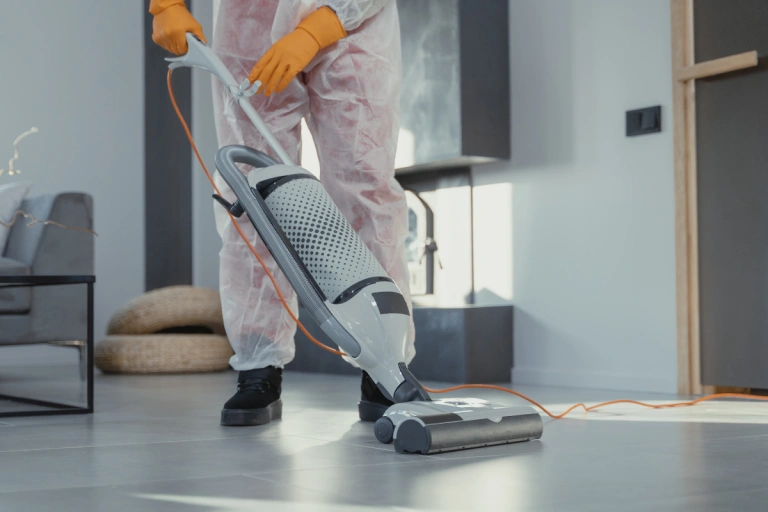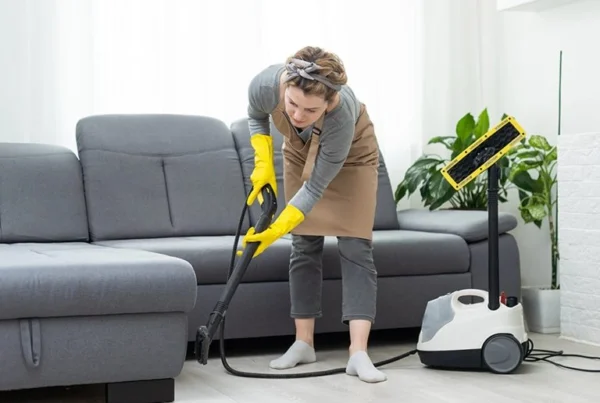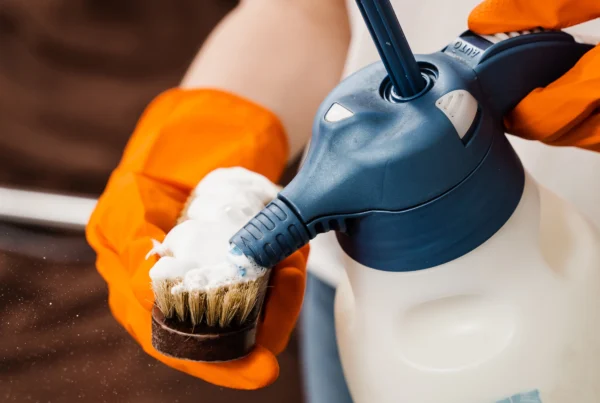How Often Should a House Cleaner Come? Weekly vs Bi-Weekly Explained
If you’ve ever hired a cleaning service or considered doing so, one of the most common questions you might ask is, “How often should a house cleaner come?” The answer isn’t simple; it depends on your home, your lifestyle, and how much time you can personally dedicate to upkeep.
For some households, weekly cleanings are essential to keep things running smoothly. For others, a bi-weekly or monthly service is enough to stay ahead of dirt and clutter. The key is finding the right rhythm that balances cleanliness, cost, and convenience.
In this guide, we’ll break down how often you should schedule professional cleaning, the pros and cons of different schedules, and how to decide what works best for your space.
What Does a House Cleaner Do?

Before deciding how often you need help, it’s useful to understand what a professional cleaner typically handles.
A standard cleaning includes routine maintenance tasks such as:
- Dusting furniture, picture frames, and baseboards
- Vacuuming carpets and mopping floors
- Cleaning bathrooms and kitchens
- Wiping down counters and appliances
- Emptying trash bins and tidying up surfaces
A deep cleaning, on the other hand, goes further, scrubbing tile grout, wiping baseboards, washing windows, cleaning inside cabinets, and removing stubborn buildup that accumulates over time.
When you book a professional cleaning service, the frequency you choose will often determine the level of detail you receive. Weekly cleanings usually focus on maintenance, while less frequent appointments may need more intensive work.
Factors That Determine How Often You Need a Cleaner
There’s no universal answer to how often you should hire a house cleaner. Instead, several factors influence the right schedule for your home:
1. House Size and Layout
The bigger your home, the more time it takes to clean and the more often it needs attention. A single cleaner can keep up with a small apartment once every two weeks, but a large multi-story family home might require weekly or even twice-weekly visits to stay spotless.
2. Number of Occupants
How many people live in your home greatly impacts how quickly things get messy. A family with three kids and two pets will naturally generate more laundry, crumbs, and fingerprints than a single adult living alone. More occupants generally mean you’ll benefit from more frequent cleaning.
3. Presence of Pets
Pets bring joy, but they also bring fur, dander, and odors. Homes with dogs or cats often need vacuuming, mopping, and deodorizing more frequently, making weekly cleaning ideal to maintain hygiene and air quality.
4. Your Schedule and Lifestyle
If you work long hours or travel often, you probably don’t have time for regular tidying. Hiring a cleaner weekly or bi-weekly ensures your space stays manageable without you needing to spend weekends catching up on chores.
5. Your Budget
Cost is an important factor. More frequent cleanings naturally add up over time. However, some clients find that paying for weekly maintenance actually saves them money, since each visit requires less time than a heavily overdue cleaning.
6. Personal Standards of Cleanliness
Everyone has different tolerance levels for mess. Some people can relax with a little clutter, while others can’t focus until every surface shines. Your comfort level plays a big role in determining your ideal schedule.
The Most Common Cleaning Frequencies
Professional cleaning companies usually offer flexible options weekly, bi-weekly, monthly, or as-needed. Here’s what each option typically looks like.
1. Weekly Cleaning
A weekly cleaning schedule is perfect for busy families, professionals, and pet owners who want their home to stay consistently fresh. With weekly service, cleaners can focus on maintaining tidiness rather than tackling major build-up.
Benefits:
- Your home always looks guest-ready.
- Less dust and grime accumulate between sessions.
- Each visit is quicker since cleaners maintain rather than overhaul.
- Great for allergy sufferers who need regular dust removal.
Who it’s best for:
- Families with kids or pets
- People who host guests often
- Those who dislike clutter or have limited cleaning time
Typical cost: $100–$250 per visit, depending on home size and location.
2. Bi-Weekly Cleaning
Bi-weekly (every two weeks) is one of the most popular schedules because it balances cleanliness and cost. Your cleaner will perform the same tasks as in a weekly visit, but because there’s more time between appointments, each session may take a bit longer.
Benefits:
- Keeps your home fresh without overspending
- Gives you time to do light maintenance in between visits
- Ideal for households that don’t get too messy
Who it’s best for:
- Couples or small families
- Homes without pets
- People who tidy up regularly on their own
Typical cost: $150–$300 per visit, depending on house size.
3. Monthly Cleaning
Monthly cleaning is a great option for individuals who stay organized but want professional help for hard-to-reach areas or deep sanitization. Since more time passes between visits, cleaners often perform a more intensive job each time.
Benefits:
- Cost-effective for smaller households
- Ideal for people who handle basic cleaning themselves
- Good for maintaining a low-traffic home
Who it’s best for:
- Singles or couples with small apartments
- Retirees or people who travel frequently
- Homeowners looking for occasional help
Typical cost: $200–$400 per visit
4. Seasonal or Deep Cleaning
Even if you keep up with weekly or bi-weekly cleaning, a deep cleaning every few months can make a world of difference. This type of cleaning targets areas often missed during standard sessions, such as baseboards, behind appliances, window frames, and grout lines.
Benefits:
- Resets your home to a “like-new” condition
- Helps prevent the buildup of allergens and mold
- Perfect before hosting events or holidays
Who it’s best for:
- Everyone at least twice a year!
- Homeowners preparing to sell or rent their property
Typical cost: $300–$600, depending on home size.
How to Decide What’s Right for You

If you’re unsure how often to book, here’s how to find your ideal schedule:
- Start with a deep clean. It’s best to begin your cleaning journey with a professional deep cleaning session. This gives your cleaner a “fresh slate” to maintain.
- Test weekly vs bi-weekly. Try each frequency for a month. If your home still feels messy after two weeks, weekly service may be the better choice.
- Consider your household habits. If you cook frequently, have children, or own pets, opt for more frequent service.
- Review your budget. If weekly cleaning is too expensive, consider alternating between deep and light cleans or scheduling smaller sessions for specific rooms.
- Stay flexible. Cleaning needs change with seasons, events, and family schedules. You can always adjust the frequency later.
How Long Does a Cleaning Session Take?
The time it takes to clean a home varies depending on its size and the level of cleaning needed. On average:
- Apartments or condos (under 1,000 sq. ft.): 2–3 hours
- Medium homes (1,500–2,500 sq. ft.): 3–5 hours
- Large homes (3,000+ sq. ft.): 5–8 hours
If you schedule weekly or bi-weekly visits, sessions will likely be shorter because there’s less buildup between cleanings.
The Benefits of Regular Professional Cleaning
Hiring a regular house cleaner isn’t just about convenience; it’s also about health, comfort, and peace of mind.
- Improved air quality: Regular dusting and vacuuming remove allergens like pollen, pet dander, and dust mites.
- Reduced stress: Coming home to a clean space can instantly improve your mood and mental clarity.
- Time savings: Free up hours each week to focus on family, work, or relaxation.
- Longer-lasting furniture and surfaces: Dirt buildup can damage upholstery, floors, and countertops over time.
- Consistent maintenance: You’ll never face the stress of a last-minute deep clean before guests arrive.
Tips for Working With Your Cleaner
To make the most of each session, communication and preparation are key:
- Declutter before they arrive. Put away personal items, clothes, or paperwork so cleaners can focus on actual cleaning.
- Set clear expectations. Let them know which areas you’d like prioritized.
- Be consistent. Regular scheduling helps your cleaner learn your home’s layout and preferences.
- Provide feedback. Share what you liked or what could improve after each session.
Building a consistent relationship with your cleaning team ensures better results and trust over time.
Final Thoughts
So, how often should a house cleaner come? It truly depends on your household’s needs.
- Weekly cleaning keeps your home in pristine condition, perfect for busy families and pet owners.
- Bi-weekly service offers a nice balance between cost and cleanliness for most households.
- Monthly cleaning is ideal for minimalists who just need occasional help.
- Seasonal deep cleans ensure every corner gets attention at least a few times a year.
Whatever frequency you choose, having professional help means less stress, more free time, and a consistently cleaner, healthier home.
If you’re in Surrey and looking for reliable, affordable cleaning services, ProClean’s Cleaning Services Surrey team is here to help. Whether you prefer weekly touch-ups, bi-weekly maintenance, or seasonal deep cleaning, our experienced team can tailor a schedule to your lifestyle and budget.
Book a cleaning today and experience the comfort of walking into a spotless home without lifting a finger.
Follow us on our socials here:
Find out more articles that can help you below:





